I’m just going to get this out of the way right now. I feel that Casino is a bad movie. When I say bad, I mean awful. I, like most people, enjoy most of Martin Scorsese’s films, but I will admit his filmography is not immaculate. Shutter Island was disappointing in that there should have been more with the talent involved. Cape Fear was a pale imitation of the 1962 original while, The Color of Money could easily be called Martin Scorsese’s worst film to date. So, why am I not writing about The Color of Money? It’s easier to hop onto something that most people agree with: The Color of Money is weak, and I don’t want to do that. Instead, I would rather focus on a theory that I have: Casino was a spoof of Goodfellas.
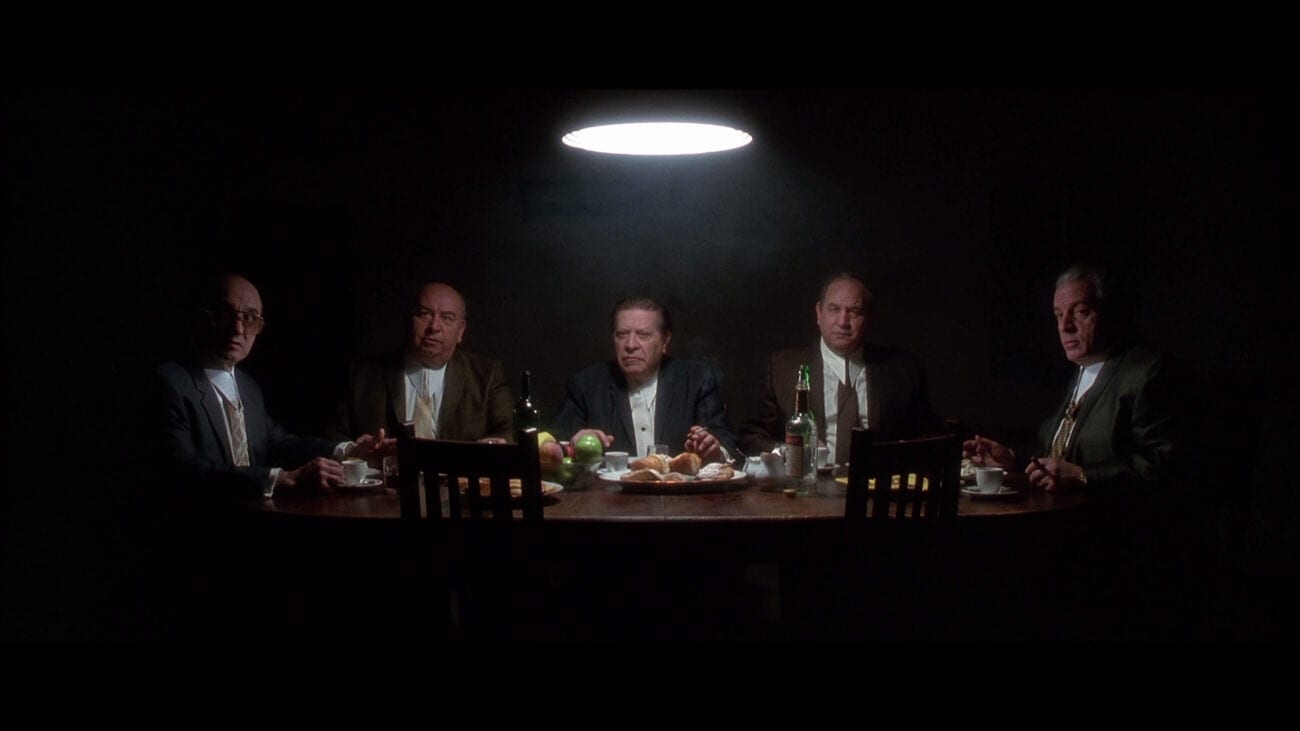
In the past, Martin Scorsese has infused his films with a dark sense of humor. From After Hours to The Wolf of Wall Street and Bringing out the Dead, Scorsese has been able to add touches of humor to the dark subject matter. Hell, Goodfellas has plenty of laughs throughout its 145-minute running time. Not to say that Scorsese is the next member of the Zucker, Abrahams, and Zucker group, but the idea of him making a comedy is not out of the realm of possibilities.
I’m not going to go in-depth with the descriptions of Goodfellas and Casino, as I assume by reading this, you are familiar with both. To make my argument, though, I will need to do a bit of recapping on both films.
Goodfellas came out in 1990, with Scorsese co-writing the film with Nicholas Pileggi, based on Pileggi’s book: Wiseguy. Told in voice-over, Henry Hill (Ray Liotta) recounts his life of joining the mob with two close associates, the calm and collected Jimmy Conway (Robert De Niro) and the hot-headed Tommy Devito (Joe Pesci). Henry’s weaknesses get the best of him, and in the end, it ends badly for everyone. In the aftermath, Henry yearns for his former life while all those around him are arrested or dead.
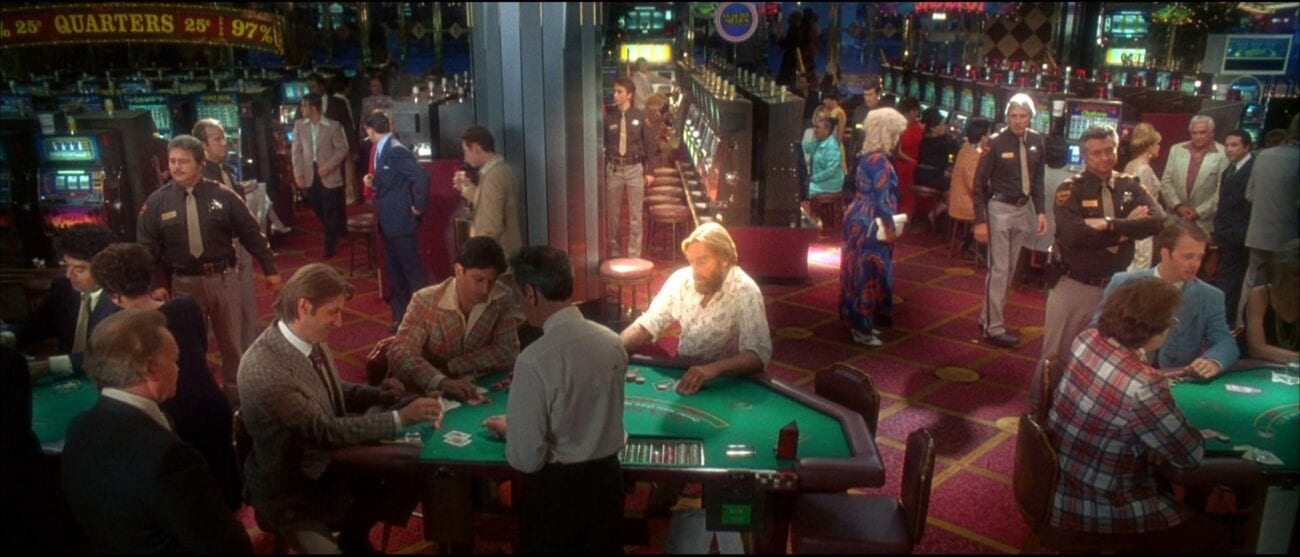
Five years after the release of Goodfellas, Scorsese and Pileggi teamed up once again, basing Casino on Pileggi’s book: Casino: Love and Honor in Las Vegas. Told in voice-over, the calm and collected Sam “Ace” Rothstein (Robert De Niro) recounts his life as a mob associate and sports handicapper and deals with his untrustworthy wife Ginger (Sharon Stone), and his hot-headed friend, Nicky Santoro (Joe Pesci). Ace’s weaknesses get the best of him, and in the end, it ends badly for everyone. In the aftermath, Ace yearns for his former life, while all those around him are arrested or dead.
Sure, when I say it like that, it just sounds like he remade the same move again. And that could be the case. Has Scorsese ever thrown in the towel like that, though? Just copy something he had done. Sure, he’s had recurring themes, plots, locations, and actors, but Scorsese has never blatantly made the same movie twice. Would he go back to the same well and waste his time re-doing something he has already done, and better? I don’t think so.
I have no evidence to support my claim, and I’m probably wrong like I usually am. And if I’m wrong, so be it. If I’m right, though, well, that still means nothing. Let’s spend a few minutes and go down the rabbit hole.
Right off the bat, you realize that we are not going to be experiencing one of the Seminal works of a great director. The opening shot has Ace exiting a building and entering his car while musing about love. Ace enters his automobile, and the car, with him in it, explodes. Everything about this one-shot is all you need to know that this will not be a masterpiece, so let’s break down the more egregious moments.
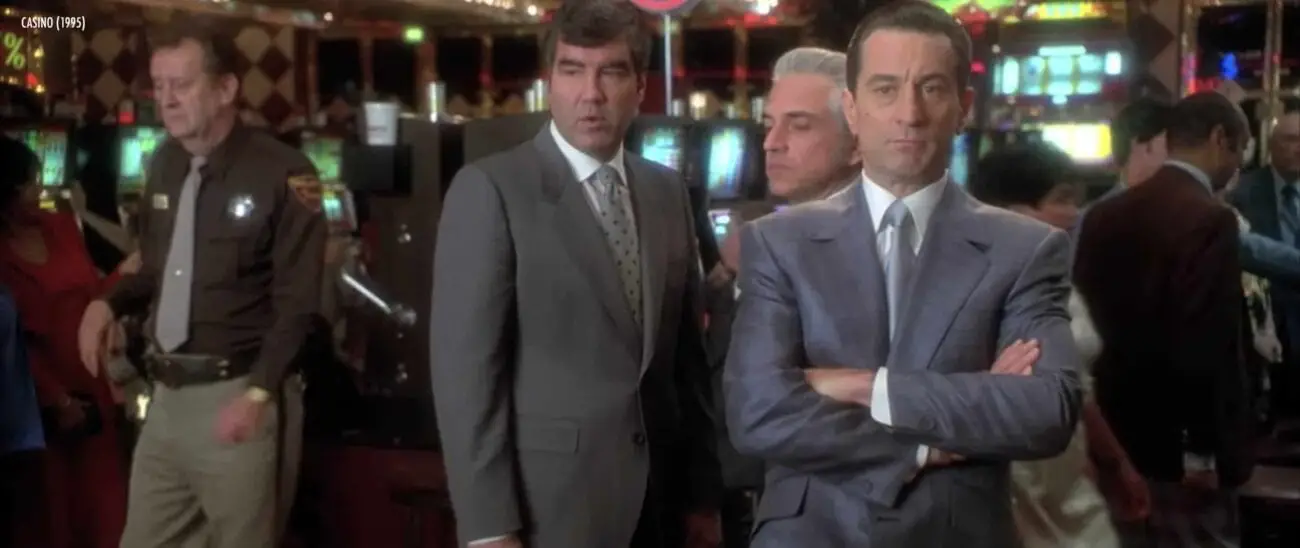
Let’s start with Robert De Niro’s narration. As De Niro narrates this scene, along with the rest of the movie, it feels as if he would rather be anywhere else. One could argue that this represents his character: calm, cool, and collected. That could be the case, but it does not make for engaging narration. Mercifully, the narration comes to as close as Ace enters his vehicle, initiating the explosion.
By 1995, Scorsese was a well-worn veteran within Hollywood. Having classic films such as Taxi Driver, Raging Bull, and Goodfellas under his belt, there was no doubt as to his abilities in staging a shot. So, it boggles the mind when Ace enters his vehicle and closes the door; there is an abrupt and hilarious edit to place an obvious dummy in Ace’s seat before the car explodes. Remember, this is the first shot of the film, and it’s all downhill from here.
Before you even have time to compose your thoughts on the shoddy filmmaking, the most self-serious opening credits you will ever see fill the screen. Created by Elaine and Saul Bass, a caricature of Ace flies across the screen accompanied by flames and the lights of Las Vegas. As if there wasn’t enough melodrama, and to hammer home the operatic nature of the film, the title sequence uses a dramatic piece of music from Johann Sebastian Bach. This opening sequence goes on for two minutes. Two. Freaking. Minutes.
Remember the opening credits in Goodfellas? They were quick and to the point. It’s like Scorsese was excited to tell the tale of Henry Hill and wanted to get going as soon as possible. With the opening to Casino, a bored Robert De Niro mixed with questionable directing by Scorsese, and a bombastic and pretentious title sequence makes one question if the 178-minute ride they are about to take is worth it.
Oh, and spoiler alert, what we see in the opening shot is a lie. We’ll get to that later.
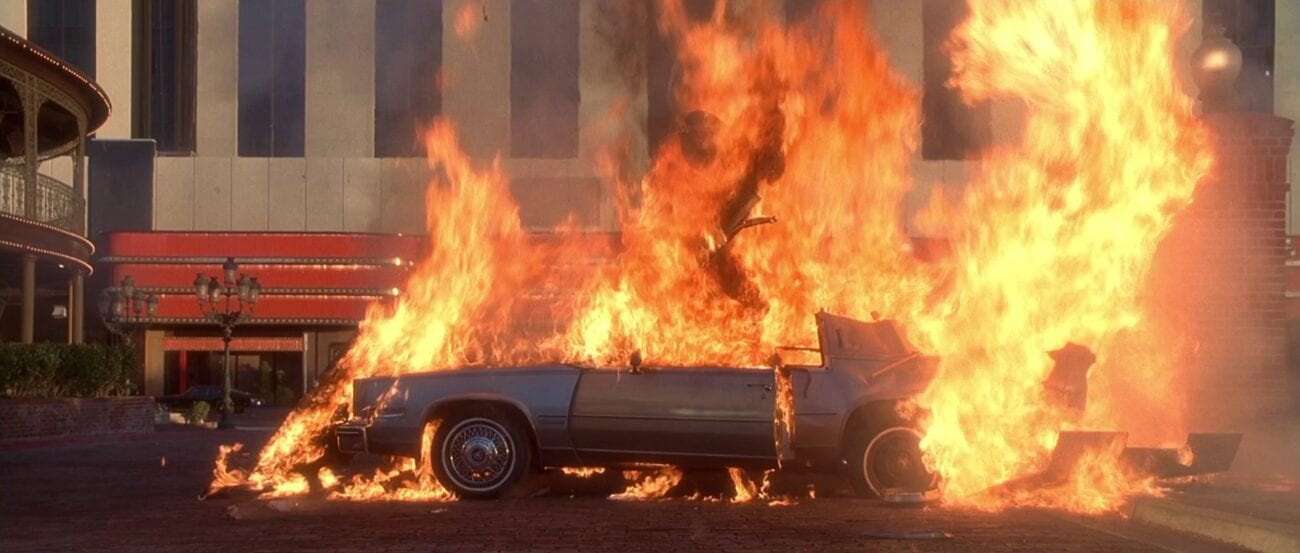
The shoddy filmmaking continues as Scorsese breaks out all the Scorsese-isms that you would expect: a who’s who of a soundtrack, jumps in time, and narration. Lots and lots of narration. I’m not someone who gets offended with narration; I feel that Scorsese understands narration as much as any other director and utilizes it efficiently. With Casino, the frequency at which the narration occurs, compounded with the random narrative points of view, makes it feel like this came from a first time director. When I say random, I mean that. Even though we have three main characters, we only get two narrators (Sharon Stone must have had the night off or something).
You might think, sure, there’s nothing wrong with opposing viewpoints, right? I agree. What constitutes random for me, though, is the moment in the film when Nicky’s associate Frank (Frank Vincent) pays a visit to Remo (Pasquale Cajano), the boss. Now, more than halfway into the film, Scorsese decides to add Frank’s narration to the proceedings. As jarring as this is, you would think that, if we’re going to add this additional element, there must be something important to say.
Since you’ve come this far in the article, you know the answer is: of course not! Instead, this momentary shift in perspective treats the audience like morons. Frank narrates on a choice he has to tell Remo and what the repercussions would be depending on the answer given. We understand this. We’ve come this far in the film, we the audience, are aware that each decision could have dire consequences. It feels as if Scorsese and Nicholas Pileggi think the material is too complicated for the viewers to grasp and want to hold your hand every step of the way.
So, throughout this three hour plus ordeal, Ace narrates every single thought about his life, his work, and his feelings. Yes, sometimes it works well as he walks the audience through the stages of security at The Tangiers Casino to ensure everyone is doing their jobs. Cool, I’m down with that. Where it gets offensive comes in the many moments that the audience should figure out on their own.
As an example, when Ace first notices Ginger, she is scheming a high roller. He is impressed with her audacity and enamored with her good looks. He goes on to narrate that she is a working girl who knows the ins and outs of getting what she wants from who she wants. To go along with this, we also see how Ginger takes care of everyone. Even with these red flags, Ace decides to take a chance and marry Ginger. Yes, we’ve seen the story of someone doing something they know will not end well, but we don’t need reminding from Ace about the situation. Voice-over narration about him relying on sure things and taking a chance on her are redundant. Redundancy is not what this bloated mess needs, unfortunately, this movie brims with it.
Leaving aside the narration, let’s move on to weaknesses. Ace’s weakness is all about Ginger. What’s her weakness? Well, besides drugs, money, and freedom—it’s her pimp, Lester Diamond (James Woods). Casting James Woods to play a scumbag is nothing new—I’d say it’s almost a given. James Woods does sleazy well, but can also play a villain on par with Joe Pesci in the “wild” department. Early on, we come to see Lester preying upon Ginger for money, setting up a confrontation with Ace or maybe Nicky.

Instead, we get a minor subplot that goes nowhere with Ace’s henchmen handling the situation. There’s no dynamic here. Nothing in the story changes whether Lester is there or not. He means zero to the outcome. Maybe that was Scorsese’s plan in hiring James Woods? He wanted us to think that he would be a threat but is nothing more than a nuisance to Ace. I know that the basis for this character served a purpose in real life, but this isn’t real life. As a film character, Lester is weak at best.
Speaking of weak, even though Ginger starts as a tough, street-smart working girl, her character devolves in typical Scorsese fashion. Initially, she sees Ace as someone who can provide her with everything that she needs but controls her to where she feels suffocated. From this point, she whines, screams, drinks and has the expected downfall until her predictable end. Sure, we’ve seen roles like this done well, and Sharon Stone received an Oscar nomination for her performance, but I do not understand why. There is no nuance here, and I get there is not supposed to be, but when looking at the film, do you think she gives an Oscar-worthy performance?
While we’re on the topic of Oscar-worthy performances, let’s talk about Joe Pesci’s performance as Tommy—I mean Nicky. Sorry, I got confused there for a sec. Do you know how jokey impersonations of Joe Pesci portray him as an unhinged individual that flips out at a moment’s notice? Nicky is that. The only difference is that it’s Joe Pesci doing the impersonation. Is Nicky truly a different character than his role as Tommy in Goodfellas? Lending credence to my theory that this is a spoof, I believe Joe Pesci knew he was doing a discount version of Tommy and parodied his Oscar-winning role. That would be the only rationalization I can come up with—why else would he revisit such familiar territory?
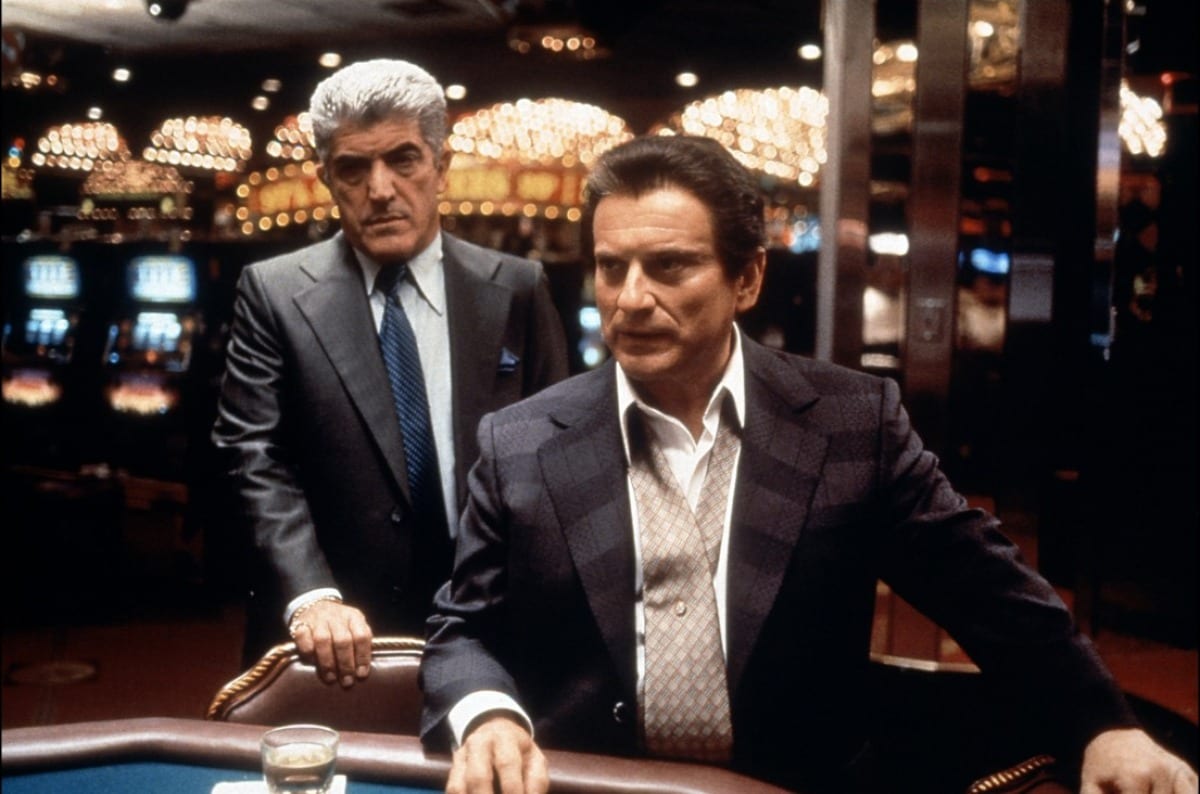
I touched on questionable filmmaking earlier, but I’d be remiss if I didn’t quickly mention a few more items that make me go, “huh?” First off, when Nicky is giving a verbal lashing to a degenerate gambler, he tells him, “Don’t make a fuck out of me.” You listen to that, and you assume it came out wrong, but Scorsese probably thought the take was the best delivery and left it in. That could be the case, but you are Scorsese. He is Joe Pesci. I know Scorsese could get the correct performance AND the correct line in another take. Why settle? I guess the rationale is that it feels closer to reality, and when you’re upset, sometimes the words you say aren’t what comes out.
Not to be outdone with one bad line, Ace has a more egregious one when firing an employee, Ward (John Bloom). During a heated back and forth, Ace fires Ward causing Ward to ask, “You’re firing me?” As we talked about earlier, the film treats the audience like children, so when Ace says, “You’re fired,” we need to make sure Ward relays that back incase audience members in the back row missed it. Replying to Ward, Ace utters, “I’m firing you. No, I’m not firing you, I’m firing you, yo–” before cutting to the next shot. As I sit there and watch this scene, I think back to the 1994 film Ed Wood and the titular character’s reluctance on second takes. Was this another moment of “realism” and not quite spewing out everything clean, as would be in a film?
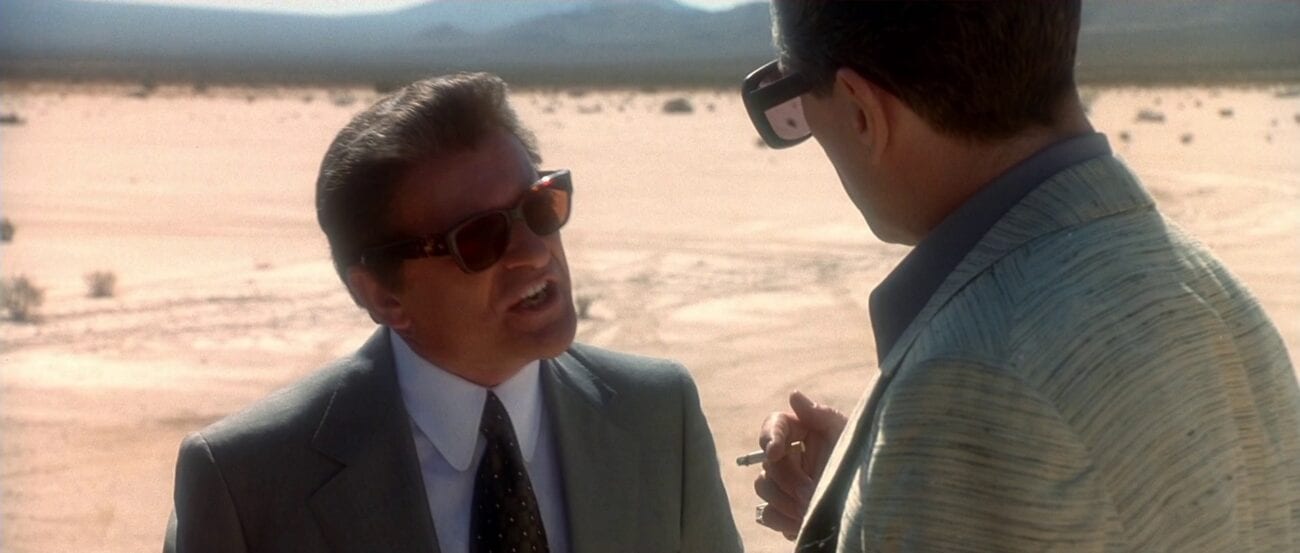
Capping off the subplot involving Ward brings about another perplexing moment. As Ace is meeting with the county commissioner to asking about Ward’s reinstatement, Ace gets up and walks to the closet. Revealing himself to wearing shoes and socks but no pants, he retrieves the pants from the closet and puts them on. Ace then meets with the county commissioner, and the scene continues onward, without any reasoning or context for the lack of pants.
This scene has caused me a lot of questioning and befuddlement—only recently finding out why there was a lack of pants. According to Scorsese’s commentary, the lack of pants comes from Ace not wanting to wrinkle them while sitting at his desk. Perfectly understandable, I get that. The issue I have is that it never comes up again and does nothing to serve the story, or really, Ace. By this point in the story, we already know Ace is a control freak. Every facet of his life, work, and personal, are dictated with purpose. Adding this moment does nothing for the character or story, resulting in confusion and unintentional laughter. Incidentally, this is a moment where a voice-over explanation might have been merited.
Should we go into the final meeting between Ace and Nicky? While nowhere near the worst scene of the film, it is still a source of unexpected comedy. As Ace awaits the arrival of Nicky, speeding towards him, Scorsese hits the audience with a stylized, if terrible shot: a mock-up of Ace’s face with glasses as Nicky’s car drives along in the reflection. I feel this was a shot with good intentions, but the execution was lacking. Once Nicky arrives, we get a load of Pesci’s greatest hits, complete with the usual abundance of colorful language. After the one-sided diatribe, Nicky returns to his car and speeds off, tires squealing aplenty on the desert sand. Squealing. On sand? Usually, I’m not one to nitpick, but there are moments of shoddy filmmaking like this all over the film.
And there are plenty of other moments that make you question the legitimacy of Casino. The highly-stylized yet over the top lighting from Robert Richardson. Or the obviously fake bats used in a scene late in the film? There’s also an oddly-flat dialogue scene between Ace and Nicky while “Go Your Own Way” by Fleetwood Mack plays in the background. Along with being a scene of low energy, the choice in song is heavy-handed, at best.

Casino is not a good film. Not by a long shot. At the same time, though, despite its length, I have watched it more than most other bad movies out there. Watching something that has all the parts to be a masterpiece and fail miserably is awe-inspiring. When you hear that Robert De Niro, Sharon Stone, and Joe Pesci are starring in Martin Scorsese’s latest crime drama from the writer of Goodfellas, there is a level of competency that you expect. When every single moment rings false, you conclude that this did not happen by accident. Casino was a choice. This three-hour spoof starts with a bang and ends with the destruction of everything that came before it.
“Wait,” you say. “What about the opening being a lie?” It is. We see the explosion three different times and three different results. The first time, Ace’s dummy gets blown to smithereens. Later, we see Ace has more time in the car yet still gets blown up. Finally, we see Ace have enough time to exit his vehicle and get to safety before the bomb explodes. It honestly makes no sense. Even during his earliest films, Scorsese has directed his projects with a sense of professionalism. As Ace says regarding the bombing, “It’s amateur hour.” It’s almost as if Scorsese has become self-aware and is letting the audience in that he is making fun of himself as if Casino itself is a spoof.




A lot of these complaints could just as easily be lobbed at Goodfellas. The exploding dummy or bending baseball bats are no worse than blood that’s supposed to fly out of Sam Jackson’s head clearly coming from offscreen…or DeNiro knocking an entire telephone booth over… or the obvious retractable spring knife used to stab Frank Vincent. Scorsese movies have always been that way. He’s more concerned with the emotion of the moment than getting bogged down with elaborate special effects. This also explains what you considered dialogue screw-ups.
As for Joe Pesci playing the same character… Well, a couple things. First off, Pesci was somewhat miscast in Goodfellas. Don’t get me wrong, I wouldn’t change a frame of that film, but Pesci was way too old (he’s supposed to be roughly the same age as Henry Hill, as seen in the flashbacks). The real guy he was playing was killed when he was 28 (not to mention, over 6ft tall). In Casino, on the other hand, Pesci is perfectly cast. The real guy he was playing had the same build and the same volatile temper. As for similarities in the performance… Who gives a shit? There are many great actors who play similar types of characters throughout multiple films. Not everyone needs to be a chameleon disappearing in every role. I could just as easily complain that Pesci’s character in Goodfellas is just his character from Raging Bull but with all the nuance removed. But I won’t, because that’s dumb.
As for loose plot threads…Scorsese has never been a plot oriented director. He’s about character, mood, seemingly insignificant details that every other film skips over. There are a lot of scenes in Goodfellas that one could claim don’t actually effect the overall plot, but that’s not why we watch Scorsese films.
The pantsless scene is one more of those seemingly insignificant details. It reinforces DeNiro’s character while adding a bit of levity. Plus it’s funny as hell (not unintentionally so). I also don’t understand how you didn’t get why he was pantsless.
Casino isn’t a perfect film, but that’s part of its charm. It’s a Vegas movie. It’s supposed to move too quickly, be hyperstylized & bombastic & full of jarring, visceral moments, just like the town where it’s set. Plus it’s entertaining as hell. Maybe Scorsese’s most entertaining film.
Is this article a spoof?